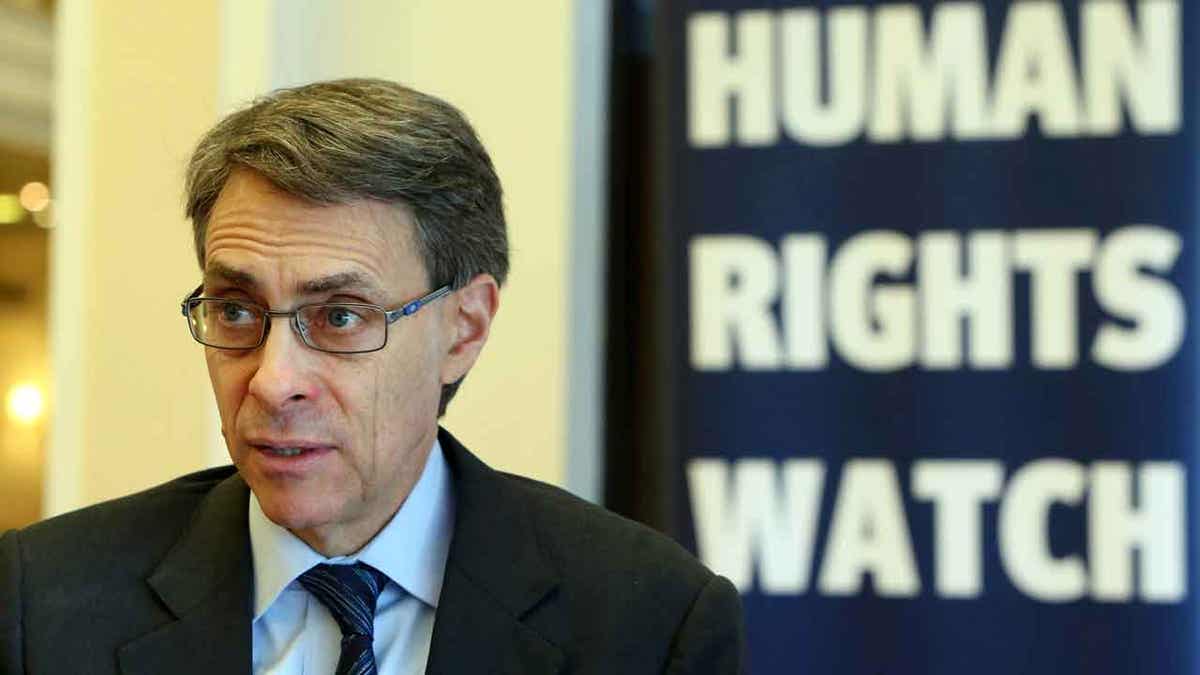Fox News Flash top headlines for January 19
Fox News Flash top headlines are here. Check out what's clicking on Foxnews.com.
Harvard University announced Thursday that it plans to offer a fellowship to a leading human rights activist after its initial denial sparked widespread criticism.
Kenneth Roth, who was the executive director of Human Rights Watch, or HRW, until last year, was recruited by the Harvard Kennedy School’s Carr Center for Human Rights Policy to become a fellow and he accepted. But a few weeks later, in July, Roth said the center called and told him that the dean of the school, Douglas Elmendorf, had not approved it.
Roth said he wasn’t given a reason but believes it was due to his and his group’s criticism of Israel.
In a statement Thursday, Elmendorf said he "made an error in his decision" not to appoint Roth and would now offer him the fellowship. He said his initial decision was not influenced by donors or to limit debate at the Kennedy School but based on "my evaluation of his potential contributions to the School."
"I am sorry that the decision inadvertently cast doubt on the mission of the School and our commitment to open debate in ways I had not intended and do not believe to be true," he said. "The broader faculty input I have now sought and received has persuaded me that my decision was not the best one for the School."
HARVARD AFFIRMATIVE ACTION CASE: SUPREME COURT MUST DEFEND COLOR-BLIND CONSTITUTION
Roth posted a statement on his Twitter feed, saying he was "thrilled" with Harvard's decision. He told The Associated Press he hopes to start in February.
"I have long felt that the Carr Center and the Kennedy School would be a congenial place for me to work on the book that I am writing," he tweeted. "I look forward to spending time there with colleagues and students."
But Roth also called for greater transparency from Harvard to explain what led Elmendorf to make the initial decision and called on the university to demonstrate that its response wasn't simply because he was a "well-known individual."
"What I am hoping is that the Kennedy School and Harvard University more broadly will use this as an opportunity to reaffirm their commitment to academic freedom even when Israel is criticized," he told the AP.

Human Rights Watch's executive director Kenneth Roth speaks in Beirut, Lebanon, on Jan. 29, 2015. Harvard University announced on Jan. 19, 2022, it plans to offer a fellowship to Roth after its initial denial sparked criticism. (AP Photo/Bilal Hussein, File)
RACE-BASED ADMISSIONS? TWO HARVARD STUDENTS DEBATE AHEAD OF SUPREME COURT DECISION
A son of a Jewish refugee from Nazi Germany, Roth has acknowledged that his work has made him enemies around the world. In a brief conversation with Elmendorf before his fellowship was denied, Roth said he told the dean that he had been sanctioned by the Russian and Chinese governments and "was pretty sure the Israeli government detests me."
"That turned out to be the kiss of death," he said.
Over the years, the group has issued a number of reports saying that Israel appears to have committed war crimes against the Palestinians.
And in 2019, Israel expelled the group’s local director, accusing him of boycott activity. Roth, who at the time was HRW’s executive director, said Israel was joining a "fairly ugly group of governments" that have barred the group’s researchers. Two years later, HRW said Israeli policies toward the Palestinians amounted to apartheid. Israel vehemently denies the label and comparisons to apartheid-era South Africa.
Rights and free speech groups welcomed Harvard's decision.
"The Harvard Kennedy School’s decision to offer Ken Roth the fellowship he earned through decades of pathbreaking work defending human rights is welcome news," Jonathan Friedman, director of free expression and education at PEN America said in a statement.
"By denying him the fellowship, the university sent an alarming message that champions of human rights could see their academic careers derailed for speaking out against powerful governments," he continued. "It is important for institutions to be able to recognize where they have made an error that encroaches on free speech and academic freedom and to correct it; Harvard deserves credit for that."
Harvard’s Palestine Solidarity Committee also came out in support of the decision but said Harvard needed to do more to support academic freedom and bolster protection of Palestinian students and scholars on campus.
CLICK HERE TO GET THE FOX NEWS APP
"Roth’s presence on Harvard’s campus will be of great value to Harvard Kennedy School students and broader human rights discourse, but Harvard’s administration must also do more to actively center Palestinian voices and perspectives," the group said in a statement. "As Roth’s case shows, Harvard students and faculty are increasingly aware of the injustices Palestinians face on and off campus, and will not stand idly by if the university continues to silence legitimate criticism of Israel."
But one group who had praised the initial decision criticized the latest move.
"NGO Monitor is disappointed by the reversal by the dean of Harvard’s Kennedy School of Government regarding Ken Roth’s application for a fellowship in human rights," the group said in a statement. "During 30 years as head of Human Rights Watch, Roth has consistently singled out Israel uniquely for demonization and delegitimization, which contributed to the rise in antisemitism and discrimination, including against Jewish students on university campuses."
The Israel-Palestinian conflict is an extremely fraught subject on college campuses these days.
A boycott movement against Israel has made great inroads on many campuses. Israel’s supporters, meanwhile, say the country is unfairly singled out and that the boycott movement masks a deeper agenda to delegitimize and even destroy Israel.





















